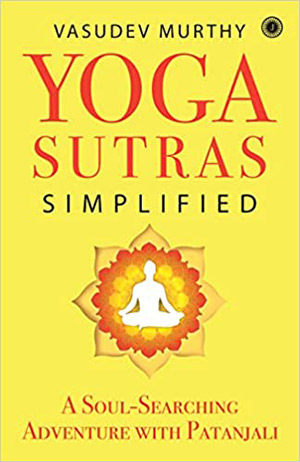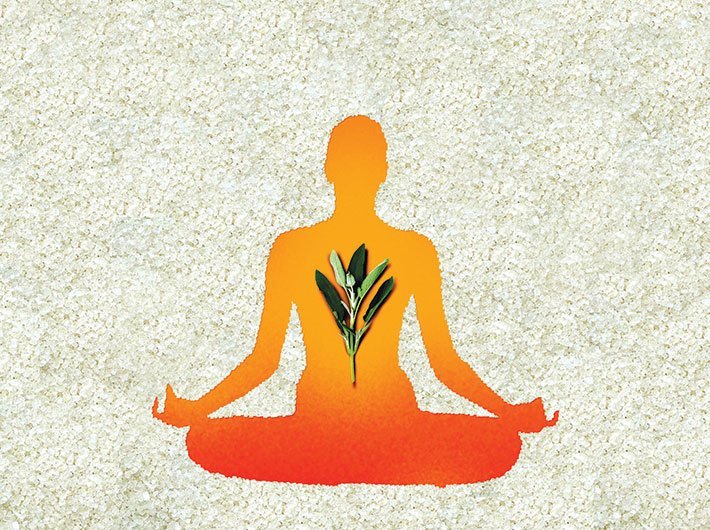An excerpt from Vasudev Murthy’s ‘Yoga Sutra Simplified – A Searching Adventure With Patanjali’
The Yoga Sutra of Patanjali is one of the key texts for spiritual seekers. While there are countless translations and commentaries, Vasudev Murthy’s ‘Yoga Sutra Simplified – A Searching Adventure With Patanjali’ (Jaico Books) offers a simple introduction to the text, with notes and charts. Crucially, it makes the content reader-friendly without trivialising it.
 Yoga has been used for millennia as a tool for self-discovery and illumination, with the ultimate goal of uniting the individual consciousness with the universal. This book expounds the purpose and meaning of yoga, going beyond the popular physical aspects. Murthy shares the steps we need to master to gain more control over our mind and in turn, our daily life. It liberates you as a leader and a human being.
Yoga has been used for millennia as a tool for self-discovery and illumination, with the ultimate goal of uniting the individual consciousness with the universal. This book expounds the purpose and meaning of yoga, going beyond the popular physical aspects. Murthy shares the steps we need to master to gain more control over our mind and in turn, our daily life. It liberates you as a leader and a human being.
In this gentle elaboration of the Patanjal Yoga Sutras, Murthy also delves into the fundamental questions of life. Taking the reader through Patanjali’s 196 power-packed sutras, he explains the purpose and meaning of yoga, going beyond the popular physical aspects. He shares the steps we need to master to gain more control over our mind and, in turn, our daily life.
Murthy, also a musician and yoga practitioner, has written several works of fiction and non-fiction across genres. ‘Yoga Sutra Simplified’ has a foreword by Yogacharya Dr. Ananda Balayogi Bhavanani, chairman, International Centre for Yoga Education and Research (ICYER).
Here is an extract from the book:
Cultivate the art of meditation
Like everyone else, I always thought of meditation as something I could not do. It seemed pretentious, wholly impractical and a cowardly way to escape reality.
Assuming you do see—however reluctantly—a value in meditation, you may experience, over time, a certain peace that is hard to describe fully. Suffice to say that all the human experiences that caused so much stress will suddenly seem small and insignificant. As your mind recognises this and declines to engage with negativity, the body responds too.
In my own case, I have observed that my heartbeat can reduce to about 55 beats per minute from the regular 73. This involves deep breathing and a complete focus on the movement of breath and a determined blocking out of all sensory distractions.
But the question that needs to be asked is—meditate on what?
Patanjali approaches this matter with a deceptively simple exhortation: Meditate on a single object. But before beginning the practice of meditation, the cultivation of positive traits is essential. Our obsession with negative and distracting influences can reduce by shifting our
focus to the opposite set of traits.
Patanjali urges us to develop qualities like friendliness, compassion and joy. These are not distractions because these sentiments are directed towards those who are happy, unhappy and virtuous, respectively. And for those who are caught in the web of wickedness and anger, be indifferent. They have to go through their journey alone. It is their karma.
How remarkable!
I remember harbouring routine sentiments of jealousy towards those who I perceived were more successful or somehow different in a “better” way. I allowed myself to be obsessed by my health and created ailments where none existed. I was irritated by those who seemed pointlessly happy. I avoided those I felt were chronically unhappy.
And I allowed hostile and crooked individuals to control me by making me react to their negative actions. All these were nothing but self-created minefields (or mind fields!).
Does all this sound familiar? Are we all guilty of little acts of self-sabotage?
Once you recognise these bubbles of distraction, you can do something about them.
And through meditation, you attain a state where breathing becomes slow and steady, your brow clears, and your mind settles and sinks deep within. The focus of your mind shifts to the very act of breathing.
Perfectly timed, acutely conscious exhalation starts resembling the removal of distractions.
Suspending breathing for short periods after exhalation or inhalation leads to a grounding of oneself.
Put together, the mind settles into a rhythm and attains the state of a remote, still lake.
Many years ago, I wrote a book on classical music. Here is an extract from it that makes the same point:
How beautiful the focused, calm mind is. No thought dares disturb the mind that has found peace through singing me. The eternal truths are twined within every phrase you make and create within me, and they do not see the need to hide or be elusive.
Why be reborn? You can commit no evil when you sing me. Your sins melt and drip away as you go past Nishad and into the next octave, exploring, exploring, asking the same questions over and over and waiting to listen to the answers again and again because they are so clear. Your mind will dive deeper and deeper into the depths of your soul, finding more and more and yet returning effortlessly to the present, understanding that the restlessness of the outer world is an illusion that must be endured till your soul is ready to move on from its temporary home.
Your body does not seek your attention any more. Your mind becomes the incense for the outside world. After singing me, listen to silence and see that there was no difference after all.
Meditation is not that simple in practice, of course. Constant, unwanted thoughts come up abruptly, and you engage with them. You try to pull away from them and repeatedly fail. This is the single biggest reason people find meditation difficult and exasperating.
But those who recognise that this phenomenon is natural and stay the course are rewarded. Being able to amplify, isolate and eliminate sensory distractions through practice causes the mind to gain confidence.
The question of what one should meditate upon is important. And yet it may not be in the way you might think.
As all distractions wilt or are pushed away, a peaceful but determined focus on an object moves the mind inwards, deeper and deeper. And there, there may be a kind of light or awareness that you recognise, which is entirely impervious to distracting emotions.
I personally choose to meditate on a single note of music. I can focus on it, and soon I feel I am that note. That is not an exaggeration. The note then starts vibrating with meaning, making everything else seem quite inconsequential.
As our ability and confidence to meditate increases with time and practice, we see that we may no longer need a specific object to meditate on.
You may meditate on an external person who you judge to be an enlightened soul. Or you may consider the evanescent and unusual knowledge that emerges from sleep. Or you may meditate on absolutely anything once you have reached an elevated level of meditative control.
Apart from dwelling on a single note, I also use a technique that invariably gives results.
While deliberately controlling your inhalation and exhalation, slowing it down as far as possible, imagine yourself at the core of an expanding globe that zooms out from your body to the far reaches of the universe.
You may imagine yourself to be the infinitely large universe, which therefore reduces all activities and actions to meaninglessness, to immeasurably small blips.
Or you can reduce yourself to a single, lone atom. In this case, the sheer expanse of space and time surrounding you similarly makes all activities a constantly swirling mass of chaos, which you observe but do not engage with.
Emerging from such an exercise gives you a halo of peace that must be experienced.
Indeed, as you will read later, Patanjali suggests that a true yogi transcends the immeasurably small to the infinitely large, all through the development of meditative abilities. That is a deeply moving concept. The meditator crystallizes all activity across the spectrum to fundamentally nothing.
[The excerpt reproduced with the permission of the publishers.]


